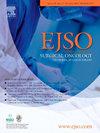局部晚期肝细胞癌经过降期治疗后,具有完全病理坏死预测因素的患者是否仍需进行肝脏切除?
IF 3.5
2区 医学
Q2 ONCOLOGY
引用次数: 0
摘要
背景:局部晚期肝细胞癌患者在肿瘤缩小分期后,肝切除术可促使病情完全缓解。然而,对于 HCC 降期后预计会出现完全病理坏死(CPN)的患者,肝切除术的额外益处尚未得到研究:2002年至2019年期间,999名局部晚期HCC患者接受了同期化放疗(CCRT)(800人)或经动脉放射栓塞(TARE)(199人)。在这些患者中,除去接受肝移植的患者,接受肝切除术(OP 组)的患者有 94 人,未接受手术治疗(非 OP 组)的患者有 867 人。采用逻辑回归分析法对 OP 组 CPN 的预测因素进行了分析。比较了有 CPN 的患者(op-CPN)和非 OP 组有 CPN 预测因素的患者(nop-CPNPF)的长期预后:结果:在手术组的 94 名患者中,38 人(40.4%)患有 CPN(CCRT,72 人;TARE,22 人)。在多变量分析中,预测 CPN 的因素是完全放射学反应和肿瘤标志物反应者(比值比 [OR] 18.468,P = 0.006;OR 3.698,P = 0.045)。在非 OP 组中,有 21 名患者属于 nop-CPNPF 组。nop-CPNPF 组和 op-CPN 组的 DFS 没有差异(40.0 ± 18.3 个月 vs. 60.0 ± 14.0 个月,p = 0.838)。OPP-CPN组的OS并不比nop-CPNPF组高(5年OS:39.4% vs. 33.3%,p = 0.328):结论:nop-CPNPF组的长期预后与op-CPN组相似,这表明在HCC降期后,肝切除可能不会为CPN-PF患者的长期预后带来额外的益处。本文章由计算机程序翻译,如有差异,请以英文原文为准。
Is liver resection still required for patients who have predictive factors for complete pathologic necrosis after downstaging treatments of locally advanced hepatocellular carcinoma?
Background
Liver resection can induce complete remission after tumor downstaging in patients with locally advanced hepatocellular carcinoma. However, additional benefits of liver resection have not been investigated in patients expected to have complete pathological necrosis (CPN) following HCC downstaging.
Methods
Between 2002 and 2019, 999 patients with locally advanced HCC underwent concurrent chemoradiotherapy (CCRT) (n = 800) or transarterial radioembolization (TARE) (n = 199). Among these patients, excluding those who underwent liver transplantation, 94 who underwent liver resection (OP group) and 867 who did not undergo surgical treatment (non-OP group) were included in this study. CPN predictive factors in the OP group were analyzed using logistic regression analysis. Long-term outcomes were compared between patients with CPN (op-CPN) and those with CPN predictive factors in the non-OP group (nop-CPNPF).
Results
Of the 94 patients in the OP group, 38 (40.4 %) had CPN (CCRT, n = 72; TARE, n = 22). In the multivariate analysis, CPN predictive factors were complete radiologic response and tumor marker responders (odds ratio [OR] 18.468, p = 0.006; OR 3.698, p = 0.045). Among the non-OP group, 21 patients were in the nop-CPNPF group. There was no difference in DFS between the nop-CPNPF and op-CPN groups (40.0 ± 18.3 vs. 60.0 ± 14.0 months, p = 0.838). The OS of the op-CPN group was not higher than that of the nop-CPNPF group (5-year OS: 39.4 % vs. 33.3 %, p = 0.328).
Conclusions
The nop-CPNPF group showed long-term outcomes similar to those of the op-CPN group, suggesting that liver resection may not provide additional benefits for long-term outcomes in patients with CPN-PF after HCC downstaging.
求助全文
通过发布文献求助,成功后即可免费获取论文全文。
去求助
来源期刊

Ejso
医学-外科
CiteScore
6.40
自引率
2.60%
发文量
1148
审稿时长
41 days
期刊介绍:
JSO - European Journal of Surgical Oncology ("the Journal of Cancer Surgery") is the Official Journal of the European Society of Surgical Oncology and BASO ~ the Association for Cancer Surgery.
The EJSO aims to advance surgical oncology research and practice through the publication of original research articles, review articles, editorials, debates and correspondence.
 求助内容:
求助内容: 应助结果提醒方式:
应助结果提醒方式:


